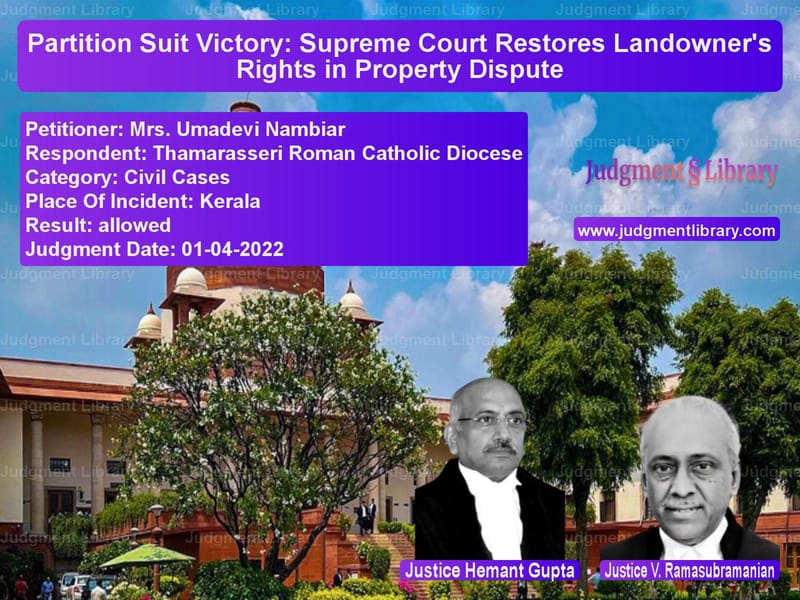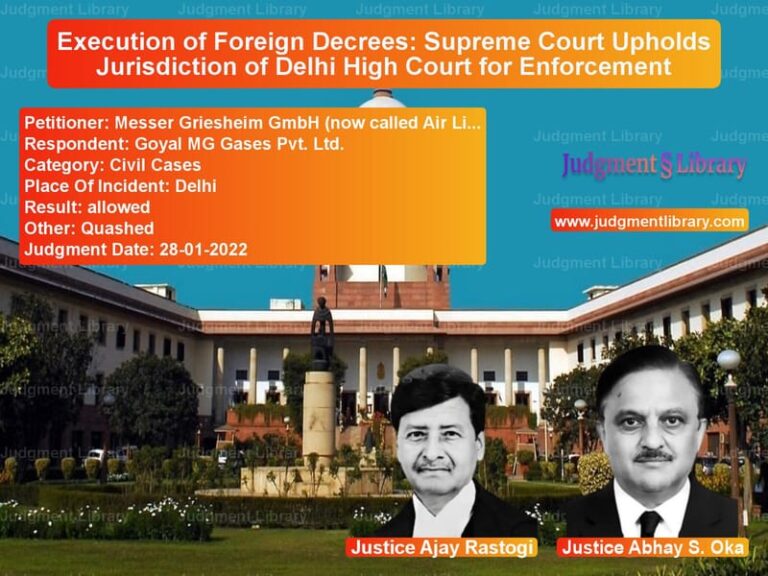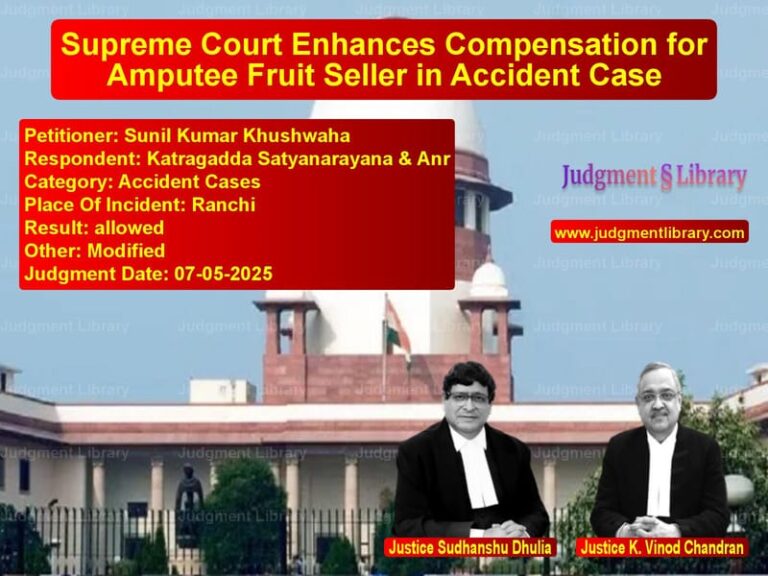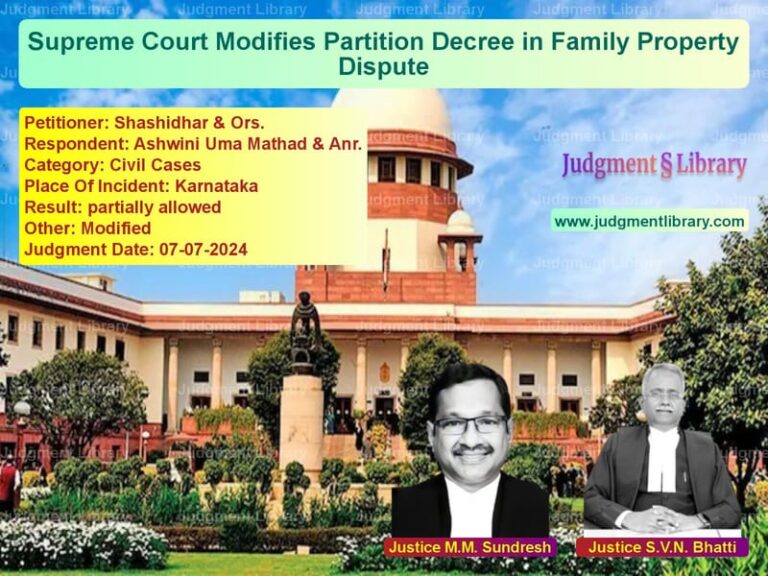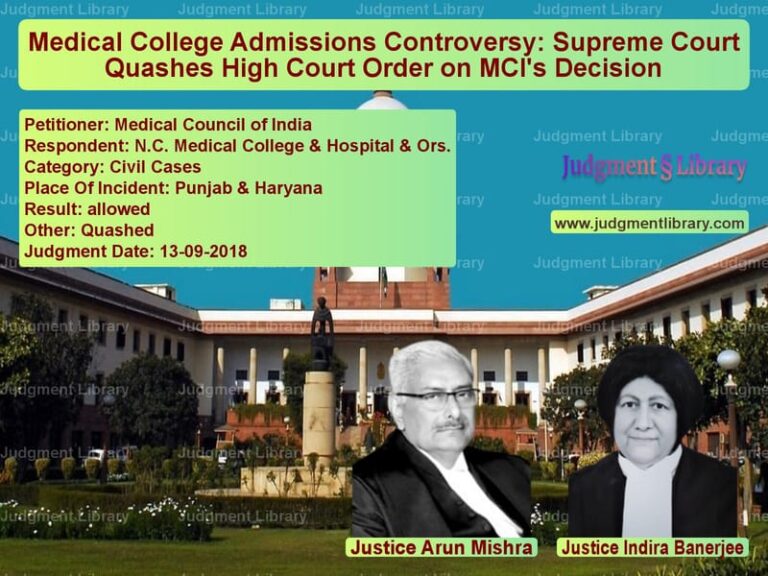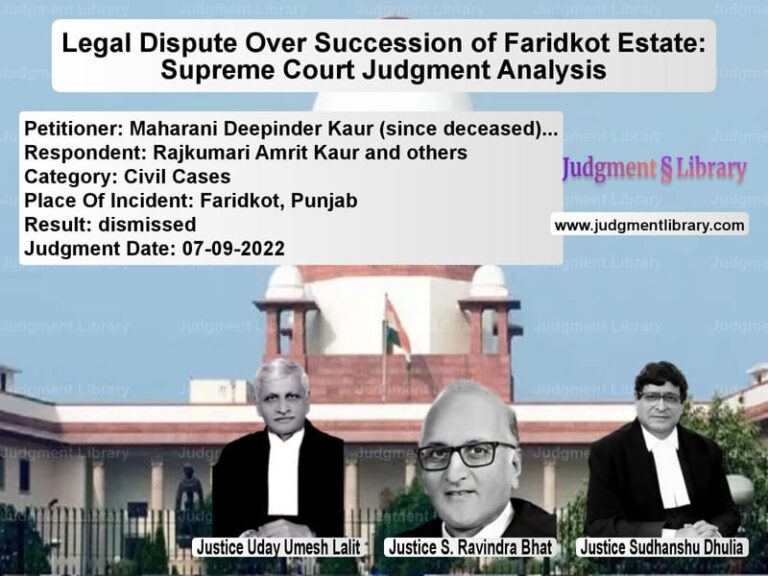Partition Suit Victory: Supreme Court Restores Landowner’s Rights in Property Dispute
The Supreme Court of India recently ruled in favor of Mrs. Umadevi Nambiar in a long-standing property dispute against the Thamarasseri Roman Catholic Diocese. The case revolved around the right to partition ancestral property, which was initially granted by a trial court but later overturned by the Kerala High Court. The Supreme Court reinstated the trial court’s judgment, affirming that unauthorized sales by an agent cannot deprive a rightful co-owner of their share.
The case highlighted key legal principles, including the authority of a power of attorney holder, the impact of constructive notice, and the inviolability of ownership rights in ancestral property. The ruling reestablished the appellant’s right to partition and separate possession of her share.
Background of the Case
The dispute concerned ancestral property originally owned by Ullattukandiyil Sankunni. Upon his passing, the property was inherited by his two daughters, one of whom was the appellant, Mrs. Umadevi Nambiar.
In 1971, the appellant executed a general power of attorney (GPA) in favor of her sister, Smt. Ranee Sidhan, granting limited authority over the property. However, the sister subsequently sold portions of the land to third parties without any explicit authorization to do so. The appellant later revoked the power of attorney in 1985 and initiated legal proceedings upon discovering the unauthorized transfers.
Initially, she filed two partition suits—O.S. No. 16 of 1986 and O.S. No. 27 of 1988—against the initial transferees. Though she secured a preliminary decree in one of the suits, she later found that the transferees had sold the property to the Thamarasseri Roman Catholic Diocese. This led to her filing another partition suit, O.S. No. 130 of 1989, seeking partition and possession of her half-share.
Petitioner’s Arguments
The appellant, Mrs. Umadevi Nambiar, contended that:
- The power of attorney did not grant her sister the right to sell the property.
- The unauthorized sales made by her sister were null and void.
- The subsequent sale to the Thamarasseri Roman Catholic Diocese was also invalid as the previous transferees had no legitimate title.
- Her legal rights as a co-owner of the property remained intact, and she was entitled to partition and separate possession.
- The High Court erred in reversing the trial court’s decree without properly considering the unauthorized nature of the transfers.
Respondent’s Arguments
The Thamarasseri Roman Catholic Diocese countered with the following arguments:
- The property had been acquired through legitimate transactions.
- The appellant had constructive notice of the sales, making her suit time-barred.
- The appellant’s prolonged silence and lack of challenge to the sales indicated acquiescence.
- The Diocese had developed the property extensively and should at least be compensated for improvements.
Supreme Court’s Judgment
The Supreme Court bench, comprising Justices Hemant Gupta and V. Ramasubramanian, ruled in favor of the appellant, setting aside the High Court’s decision. The Court made the following key observations:
- Power of Attorney Limitations: The Court affirmed that the general power of attorney did not authorize the agent to sell the property. Any sale executed without such authority was void.
- Doctrine of Constructive Notice: The Court rejected the High Court’s finding that the appellant had constructive notice of the sales, emphasizing that the absence of explicit authorization in the GPA was sufficient to invalidate the transactions.
- Invalidity of Subsequent Sales: Since the initial sales were unauthorized, the subsequent sales to the Diocese were also deemed void.
- Co-owner’s Right to Partition: The ruling reaffirmed that a co-owner’s right to partition cannot be defeated by unauthorized transactions.
- Failure to Seek Cancellation of Alienations: The Court clarified that it is not always necessary for a plaintiff in a partition suit to seek cancellation of previous sales, particularly when they were unauthorized.
- Compensation for Improvements: The Court dismissed the Diocese’s claim for compensation for improvements, ruling that it had acquired no legitimate title and was thus not entitled to any relief.
Implications of the Judgment
This ruling has several important implications for property disputes and co-ownership rights:
- Strengthening Property Rights: The judgment reinforces that unauthorized transactions cannot override a co-owner’s legal rights.
- Clarifying the Role of Power of Attorney: It establishes that a power of attorney must explicitly confer the right to sell, or else any sale is invalid.
- Ensuring Protection Against Fraud: The ruling prevents misuse of power of attorney by unscrupulous agents.
- Legal Precedent for Future Cases: The decision provides a strong precedent for partition suits where unauthorized sales are involved.
Conclusion
The Supreme Court’s ruling in Umadevi Nambiar vs. Thamarasseri Roman Catholic Diocese is a landmark decision that upholds the rights of co-owners in property disputes. The judgment serves as a reminder that unauthorized transactions cannot extinguish rightful ownership claims. By restoring the trial court’s decree and affirming the appellant’s right to partition, the Supreme Court has reinforced the fundamental principles of property law and co-ownership rights.
Petitioner Name: Mrs. Umadevi Nambiar.Respondent Name: Thamarasseri Roman Catholic Diocese.Judgment By: Justice Hemant Gupta, Justice V. Ramasubramanian.Place Of Incident: Kerala.Judgment Date: 01-04-2022.
Don’t miss out on the full details! Download the complete judgment in PDF format below and gain valuable insights instantly!
Download Judgment: mrs.-umadevi-nambiar-vs-thamarasseri-roman-c-supreme-court-of-india-judgment-dated-01-04-2022.pdf
Directly Download Judgment: Directly download this Judgment
See all petitions in Property Disputes
See all petitions in Succession and Wills
See all petitions in Landlord-Tenant Disputes
See all petitions in Judgment by Hemant Gupta
See all petitions in Judgment by V. Ramasubramanian
See all petitions in allowed
See all petitions in supreme court of India judgments April 2022
See all petitions in 2022 judgments
See all posts in Civil Cases Category
See all allowed petitions in Civil Cases Category
See all Dismissed petitions in Civil Cases Category
See all partially allowed petitions in Civil Cases Category

